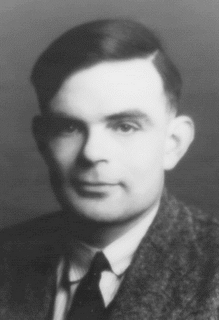Codebreaker

"One day ladies will take their computers for walks in the park and tell each other, 'My little computer said such a funny thing this morning.'" -- Alan Turing.
Mathematician and code-breaker Alan Turing was born on this day in 1912 in London. A brilliant youth who was neglected by his parents, Alan Turing was shy and socially-awkward, despite being a gifted athlete as well as a math whiz. At boarding school he developed a deep friendship with a schoolmate, Christopher Morcom, whose death when Turing was 18 left Turing devastated. Both before and after Morcom's death, it appears that Turing was confused about his own sexuality, although in later years, while he made occasional comments about having children and settling down, he was thought to have been exclusively homosexual.
In 1931, Turing entered King's College, Cambridge and found it rocked by a debate over the limits of mathematical analysis in reaction to the concept of "undecidables" put forward by Kurt Godel, who proved that there were some mathematical problems that were beyond the reach of logic. At 25, Turing imposed his indelible stamp on the debate -- and the history of computer science -- with a paper entitled "On Computable Numbers," in which he described an imaginary machine that would be capable of answering any mathematical question which could be logically answered through algorithms. Turing observed that such a machine (which he dubbed the "Universal Turing Machine"), though universal in its ability to apply mathematical logic to a problem, would be incapable of deciding whether a question was "undecidable," thus supporting Godel's view.
More interesting to computer historians, however, was that Turing's conceptualization of the Universal Turing Machine was a theoretical blueprint for the modern programmable computer. Before anything could be made of the idea, World War II had begun and Turing was invited to join the secret group of British cryptanalysts at Bletchley Park, where he led the British government's attempts to break German codes scrambled by Arthur Scherbius' Enigma scrambling machine by conceptualizing the descrambling approach and stringing together multiple descramblers. In conducting the war, Winston Churchill came to rely heavily on Turing's work, and even increased funding to the project based on a direct request from Turing himself.
After the war, Turing worked with the British National Physical Laboratory and at the University of Manchester to attempt to build a prototype of the Universal Turing Machine. A proponent of artificial intelligence, Turing unveiled his now famous "Turing test" in 1950, whereby a subject would be locked in a room to pose questions to 2 unseen answer providers, one human, one computer; if the subject was not able to tell which was the human and which was the computer by the content of the answers, then according to Turing the machine would be said to be "thinking" as well as the human.
In 1952 he admitted to police that he was having a homosexual affair, and was convicted of "gross indecency." Subjected to female hormones as "therapy" for curbing homosexual lust, Turing grew depressed and committed suicide on June 7, 1954 in Wilmslow, Cheshire, England by eating a cyanide-poisoned apple (he had been an avid fan of Disney's Snow White and the Seven Dwarfs) at the age of 41. His role in cracking the Enigma code would not be revealed until the 1970s.
Also an accomplished marathon runner, during the 1940s, Turing was unofficially one of Britain's finest, achieving a personal-best time of 2:46:3, only about 11 minutes behind Delfo Cabrera's 1948 Olympic gold-medal winning time of 2:34:51.6.
Labels: Cryptography, Information Theory, Technology, World War II





0 Comments:
Post a Comment
Subscribe to Post Comments [Atom]
<< Home